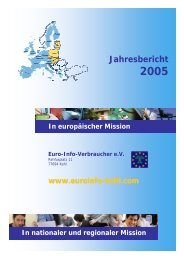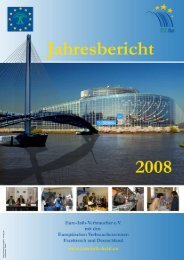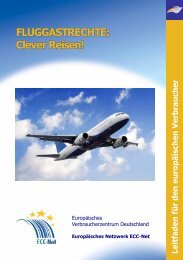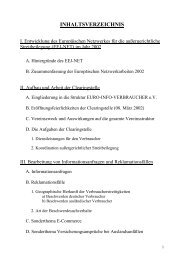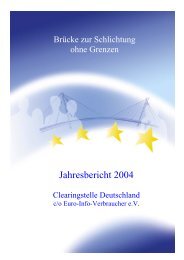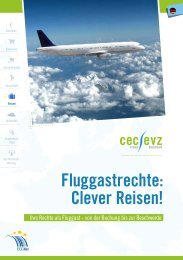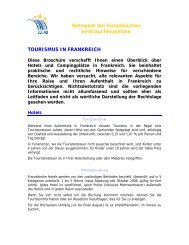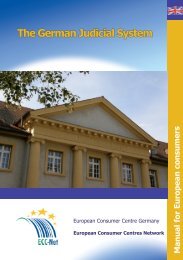Air Passenger Rights: - European Commission - Europa
Air Passenger Rights: - European Commission - Europa
Air Passenger Rights: - European Commission - Europa
You also want an ePaper? Increase the reach of your titles
YUMPU automatically turns print PDFs into web optimized ePapers that Google loves.
The client’s flight had been cancelled and they had<br />
already tried to claim reimbursement for expenses<br />
incurred as well as the compensation level listed<br />
within 261/2004. They had had no success with<br />
the air carrier who claimed the reason for the<br />
cancellation was “bad weather”. The UK ECC<br />
contacted the air carrier to put forward the client’s<br />
rights and enclosed a copy of information lodged on<br />
Eurometeo Web, showing good weather conditions<br />
listed on the day concerned. The air carrier<br />
reimbursed expenses; but, continued to claim<br />
exceptional circumstances, and refused to pay<br />
the compensation level due.<br />
The use of “exceptional circumstances” on the<br />
evidence sent to ECCs indicates that there is a<br />
lack of clarity about what it covers. In addition<br />
there appears to be no guidance about the level<br />
of evidence, or on whom the onus lies to prove<br />
exceptional circumstances. Without this, the<br />
interpretation of the legislation is clearly weighted<br />
against the passenger who does not have access<br />
to detailed weather reports or air traffic reports.<br />
Recommendations<br />
• The Enforcement Bodies designated under<br />
the Regulation should be placed in a position<br />
to investigate claims of “exceptional<br />
circumstances” and weigh up the evidence.<br />
In doing so a body of case law or decisions<br />
would be built up, which would provide some<br />
guidance on the interpretation of the<br />
Regulation, and provide increased clarity for<br />
the air passenger and adviser.<br />
5.4 Enforcement bodies<br />
EU regulation 261/2004 under Article 16 states<br />
“Each Member State shall designate a body<br />
responsible for the enforcement of this Regulation<br />
as regards flights situated on its territory and<br />
flights from a third country to such airports. Where<br />
appropriate this body shall take the measures<br />
necessary to ensure that the rights of passengers<br />
are respected… Without prejudice… each passenger<br />
may complain to any body designated under para<br />
1, or to any other competent body designated by<br />
a Member State, about an alleged infringement<br />
of this Regulation at any airport situated on the<br />
territory of a Member State or concerning any<br />
flight from a third country to an airport situated<br />
on that territory.”<br />
Of the 409 complaints and disputes where an<br />
ECC knew which agencies had been involved in<br />
the resolution of an air passenger query, only 3%<br />
were resolved via an Enforcement Body, 4% by<br />
an ADR body and 89% via an ECC.<br />
This reflects the difficulty which ECCs, and<br />
consumers approaching ECCs, have experienced<br />
when asking the named National Enforcement<br />
Bodies (NEBs) to assist in resolving passenger<br />
queries and enforcing Regulation 261/2004 in<br />
the area of cross-border air travel.<br />
In the cases examined from 2005, the problem<br />
seemed to arise from the lack of coverage by the<br />
enforcement bodies.<br />
The Greek ECC commented “The National<br />
Enforcement Body in Greece does not yet seem to<br />
have a clear understanding of their responsibilities<br />
in Greece, in order to act in favour of the consumers.<br />
They just accept the airlines’ response, without<br />
re-examining the claim in order to consider<br />
whether the claim is valid and whether to take<br />
action against the airlines.” This is reflected in<br />
25




